CBSE Class 10 English Supplementary Reader – Chapter 7 The Necklace – Download PDF Notes
The Necklace (Prose)
This chapter presents a fascinating story of a woman who wants to live a lavish life despite coming from a middle-class family. Her husband works as a clerk. In the story, the lady borrowed a necklace from her friend to attend a gathering. Unfortunately, she somehow loses it while returning home.
Would you please read the chapter to know how she returns that lost diamond necklace to her friend? To complement your reading of this lesson, you can access the PDF notes of this chapter available at GharPeShiksha. The notes contain the lesson’s theme, a summary, and vocabulary of the chapter, NCERT exercise solutions, previous year questions with solutions, sample questions that may come in your exam, moral values embodied in the chapter, model answer sheet, etc. compiled by expert teachers. Here, download the PDF notes of this chapter.
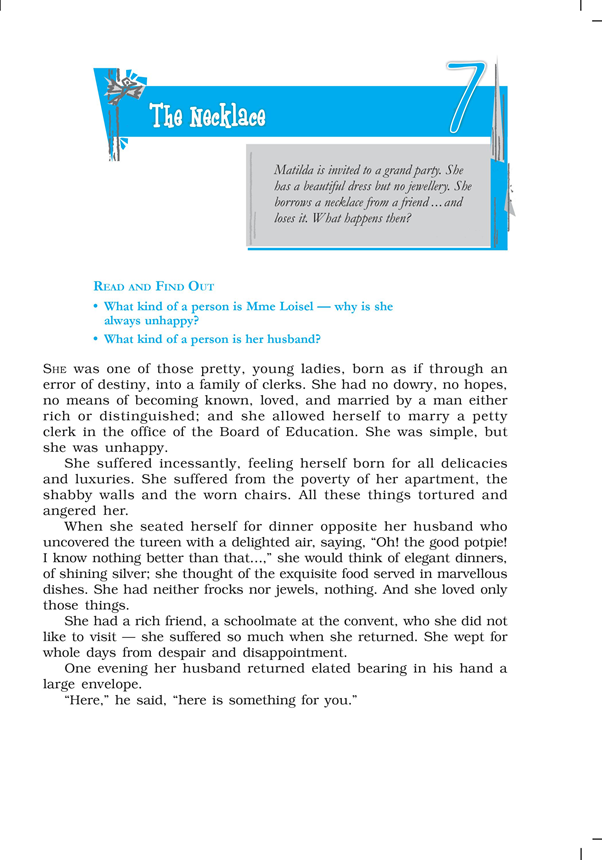
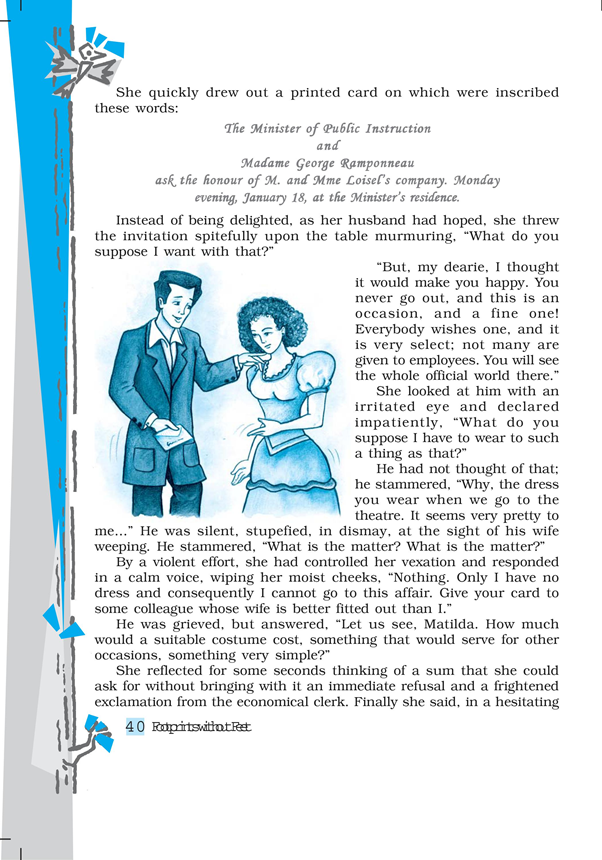
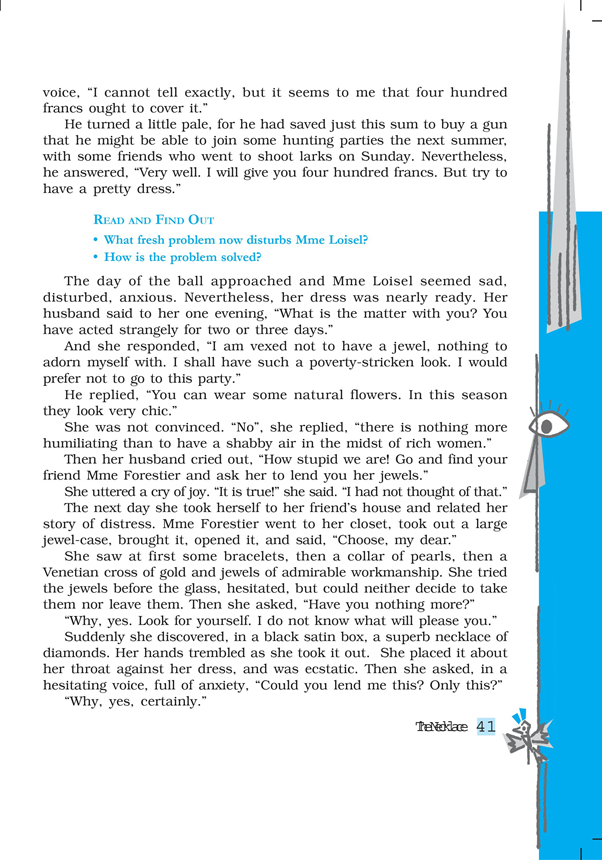
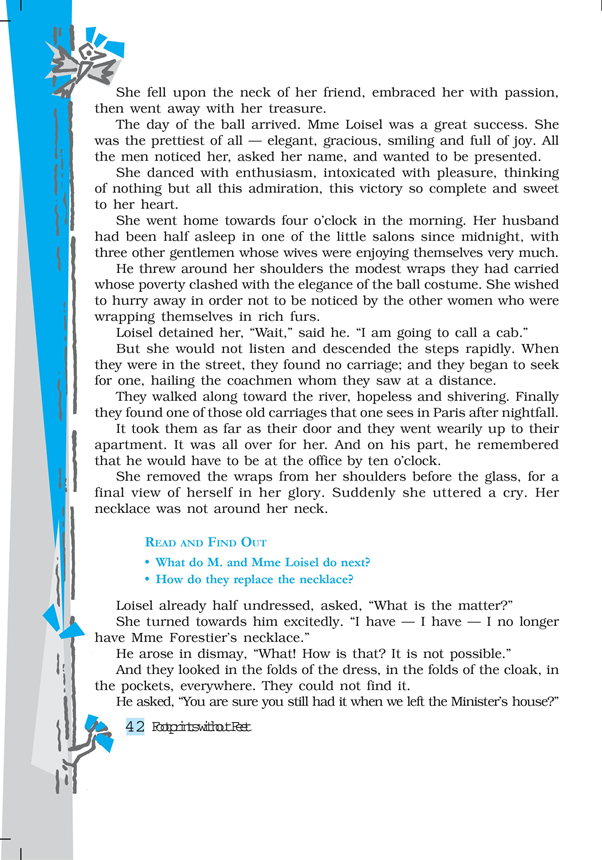
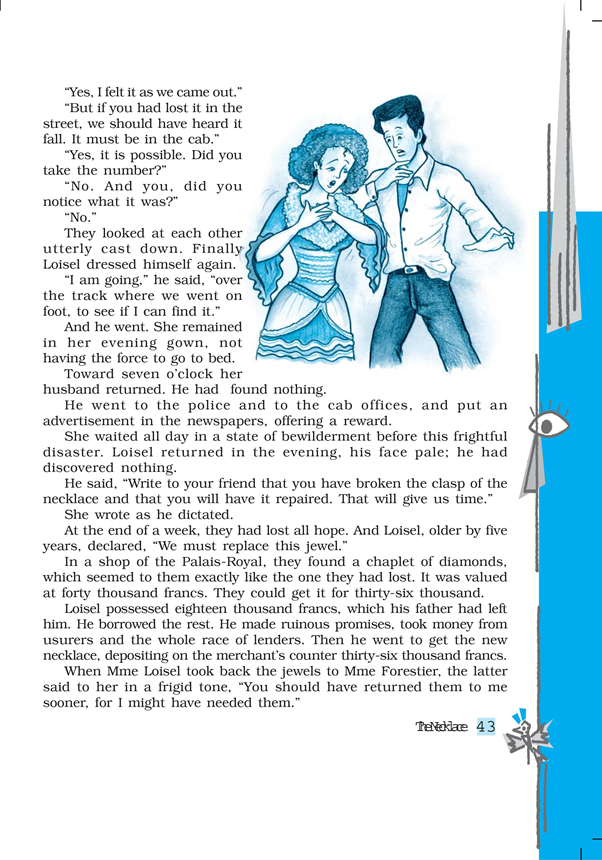
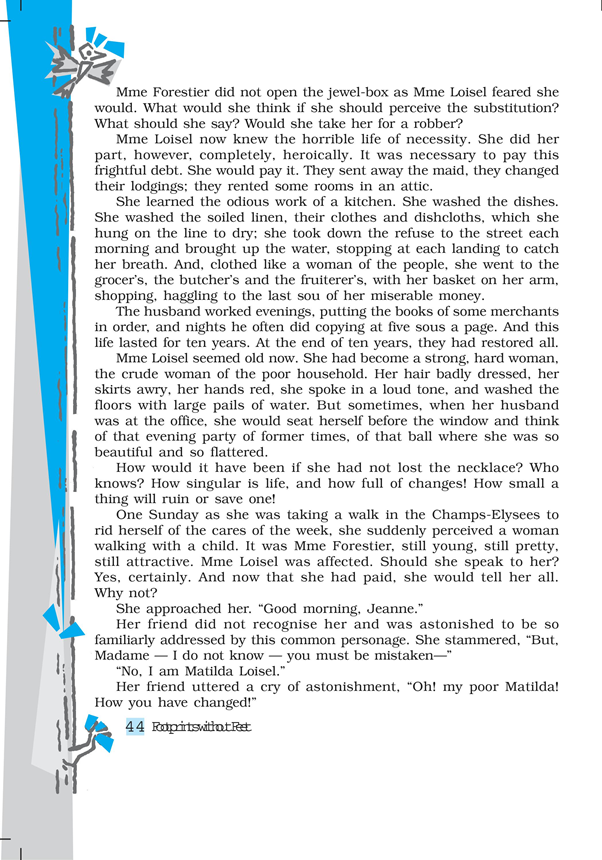
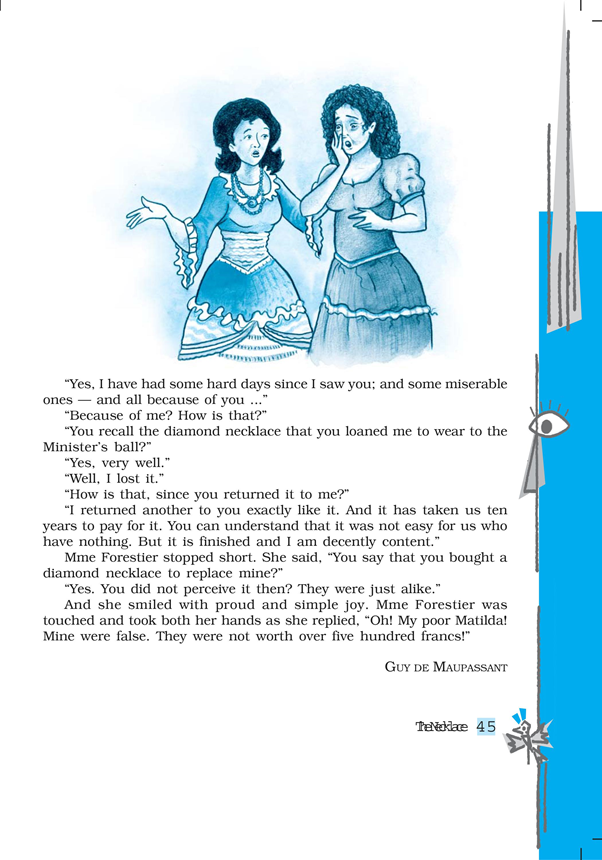
The Necklace By Guy De Maupassant
She was one of those pretty, young ladies, born as if through an error of destiny, into a family of clerks. She had no dowry, no hopes, no means of becoming known, loved, and married by a man either rich or distinguished; and she allowed herself to marry a petty clerk in the office of the Board of Education. She was simple, but she was unhappy.
She suffered incessantly, feeling herself born for all delicacies and luxuries. She suffered from the poverty of her apartment, the shabby walls and the worn chairs. All these things tortured and angered her.
When she seated herself for dinner opposite her husband who uncovered the tureen with a delighted air, saying, “Oh! the good potpie! I know nothing better than that…,” she would think of elegant dinners, of shining silver; she thought of the exquisite food served in marvellous dishes. She had neither frocks nor jewels, nothing. And she loved only those things.
She had a rich friend, a schoolmate at the convent, who she did not like to visit — she suffered so much when she returned. She wept for whole days from despair and disappointment.
One evening her husband returned elated bearing in his hand a large envelope.
“Here,” he said, “here is something for you.”
She quickly drew out a printed card on which were inscribed these words: The Minister of Public Instruction and Madame George Ramponneau ask the honour of M. and Mme Loisel’s company. Monday ask the honour of M. and Mme Loisel’s company. Monday evening, January 18, at the Minister’s residence. evening, January 18, at the Minister’s residence.
Instead of being delighted, as her husband had hoped, she threw the invitation spitefully upon the table murmuring, “What do you suppose I want with that?”
“But, my dearie, I thought it would make you happy. You never go out, and this is an occasion, and a fine one! Everybody wishes one, and it is very select; not many are given to employees. You will see the whole official world there.”
She looked at him with an irritated eye and declared impatiently, “What do you suppose I have to wear to such a thing as that?”
He had not thought of that; he stammered, “Why, the dress you wear when we go to the theatre. It seems very pretty to me…” He was silent, stupefied, in dismay, at the sight of his wife weeping. He stammered, “What is the matter? What is the matter?”
By a violent effort, she had controlled her vexation and responded in a calm voice, wiping her moist cheeks, “Nothing. Only I have no dress and consequently I cannot go to this affair. Give your card to some colleague whose wife is better fitted out than I.”
He was grieved, but answered, “Let us see, Matilda. How much would a suitable costume cost, something that would serve for other occasions, something very simple?”
She reflected for some seconds thinking of a sum that she could ask for without bringing with it an immediate refusal and a frightened exclamation from the economical clerk. Finally she said, in a hesitating voice, “I cannot tell exactly, but it seems to me that four hundred francs ought to cover it.”
He turned a little pale, for he had saved just this sum to buy a gun that he might be able to join some hunting parties the next summer, with some friends who went to shoot larks on Sunday. Nevertheless, he answered, “Very well. I will give you four hundred francs. But try to have a pretty dress.”
The day of the ball approached and Mme Loisel seemed sad, disturbed, anxious. Nevertheless, her dress was nearly ready. Her husband said to her one evening, “What is the matter with you? You have acted strangely for two or three days.”
And she responded, “I am vexed not to have a jewel, nothing to adorn myself with. I shall have such a poverty-stricken look. I would prefer not to go to this party.”
He replied, “You can wear some natural flowers. In this season they look very chic.”
She was not convinced. “No”, she replied, “there is nothing more humiliating than to have a shabby air in the midst of rich women.”
Then her husband cried out, “How stupid we are! Go and find your friend Mme Forestier and ask her to lend you her jewels.”
She uttered a cry of joy. “It is true!” she said. “I had not thought of that.”
The next day she took herself to her friend’s house and related her story of distress. Mme Forestier went to her closet, took out a large jewel-case, brought it, opened it, and said, “Choose, my dear.”
She saw at first some bracelets, then a collar of pearls, then a Venetian cross of gold and jewels of admirable workmanship. She tried the jewels before the glass, hesitated, but could neither decide to take them nor leave them. Then she asked, “Have you nothing more?”
“Why, yes. Look for yourself. I do not know what will please you.”
Suddenly she discovered, in a black satin box, a superb necklace of diamonds. Her hands trembled as she took it out. She placed it about her throat against her dress, and was ecstatic. Then she asked, in a hesitating voice, full of anxiety, “Could you lend me this? Only this?”
“Why, yes, certainly.”
She fell upon the neck of her friend, embraced her with passion, then went away with her treasure.
The day of the ball arrived. Mme Loisel was a great success. She was the prettiest of all — elegant, gracious, smiling and full of joy. All the men noticed her, asked her name, and wanted to be presented.
She danced with enthusiasm, intoxicated with pleasure, thinking of nothing but all this admiration, this victory so complete and sweet to her heart
She went home towards four o’clock in the morning. Her husband had been half asleep in one of the little salons since midnight, with three other gentlemen whose wives were enjoying themselves very much.
He threw around her shoulders the modest wraps they had carried whose poverty clashed with the elegance of the ball costume. She wished to hurry away in order not to be noticed by the other women who were wrapping themselves in rich furs.
Loisel detained her, “Wait,” said he. “I am going to call a cab.”
But she would not listen and descended the steps rapidly. When they were in the street, they found no carriage; and they began to seek for one, hailing the coachmen whom they saw at a distance.
They walked along towards the river, hopeless and shivering. Finally they found one of those old carriages that one sees in Paris after nightfall.
It took them as far as their door and they went wearily up to their apartment. It was all over for her. And on his part, he remembered he would have to be at the office by ten o’clock.
She removed the wraps from her shoulders before the glass, for a final view of herself in her glory. Suddenly she uttered a cry. Her necklace was not around her neck.
Loisel already half undressed, asked, “What is the matter?” She turned towards him excitedly. “I have — I have — I no longer have Mme Forestier’s necklace.”
He arose in dismay, “What! How is that? It is not possible.”
And they looked in the folds of the dress, in the folds of the cloak, in the pockets, everywhere. They could not find it.
He asked, “You are sure you still had it when we left the Minister’s house?”
“Yes, I felt it as we came out.”
“But if you had lost it in the street, we should have heard it fall. It must be in the cab.”
“Yes, it is possible. Did you take the number?”
“No. And you, did you notice what it was?”
“No.”
They looked at each other utterly cast down. Finally Loisel dressed himself again.
“I am going,” he said, “over the track where we went on foot, to see if I can find it.”
And he went. She remained in her evening gown, not having the force to go to bed.
Toward seven o’clock her husband returned. He had found nothing.
He went to the police and to the cab offices, and put an advertisement in the newspapers, offering a reward.
She waited all day in a state of bewilderment before this frightful disaster. Loisel returned in the evening, his face pale; he had discovered nothing.
He said, “Write to your friend that you have broken the clasp of the necklace and that you will have it repaired. That will give us time.”
She wrote as he dictated.
At the end of a week, they had lost all hope. And Loisel, older by five years, declared, “We must replace this jewel.”
In a shop of the Palais-Royal, they found a chaplet of diamonds, which seemed to them exactly like the one they had lost. It was valued at forty thousand francs. They could get it for thirty-six thousand.
Loisel possessed eighteen thousand francs, which his father had left him. He borrowed the rest. He made ruinous promises, took money from usurers and the whole race of lenders. Then he went to get the new necklace, depositing on the merchant’s counter thirty-six thousand francs.
When Mme Loisel took back the jewels to Mme Forestier, the latter said to her in a frigid tone, “You should have returned them to me sooner, for I might have needed them.”
Mme Forestier did not open the jewel-box as Mme Loisel feared she would. What would she think if she should perceive the substitution? What should she say? Would she take her for a robber?
Mme Loisel now knew the horrible life of necessity. She did her part, however, completely, heroically. It was necessary to pay this frightful debt. She would pay it. They sent away the maid, they changed their lodgings; they rented some rooms in an attic.
She learned the odious work of a kitchen. She washed the dishes. She washed the soiled linen, their clothes and dishcloths, which she hung on the line to dry; she took down the refuse to the street each morning and brought up the water, stopping at each landing to catch her breath. And, clothed like a woman of the people, she went to the grocer’s, the butcher’s and the fruiterer’s, with her basket on her arm, shopping, haggling to the last sou of her miserable money.
The husband worked evenings, putting the books of some merchants in order, and nights he often did copying at five sous a page. And this life lasted for ten years. At the end of ten years, they had restored all.
Mme Loisel seemed old now. She had become a strong, hard woman, the crude woman of the poor household. Her hair badly dressed, her skirts awry, her hands red, she spoke in a loud tone, and washed the floors with large pails of water. But sometimes, when her husband was at the office, she would seat herself before the window and think of that evening party of former times, of that ball where she was so beautiful and so flattered.
How would it have been if she had not lost the necklace? Who knows? How singular is life, and how full of changes! How small a thing will ruin or save one!
One Sunday as she was taking a walk in the Champs-Elysees to rid herself of the cares of the week, she suddenly perceived a woman walking with a child. It was Mme Forestier, still young, still pretty, still attractive. Mme Loisel was affected. Should she speak to her? Yes, certainly. And now that she had paid, she would tell her all. Why not? She approached her.
“Good morning, Jeanne.”
Her friend did not recognise her and was astonished to be so familiarly addressed by this common personage. She stammered, “But, Madame — I do not know — you must be mistaken—”
“No, I am Matilda Loisel.”
Her friend uttered a cry of astonishment, “Oh! my poor Matilda! How you have changed!”
“Yes, I have had some hard days since I saw you; and some miserable ones — and all because of you …”
“Because of me? How is that?”
“You recall the diamond necklace that you loaned me to wear to the Minister’s ball?”
“Yes, very well.”
“Well, I lost it.”
“How is that, since you returned it to me?”
“I returned another to you exactly like it. And it has taken us ten years to pay for it. You can understand that it was not easy for us who have nothing. But it is finished and I am decently content.”
Mme Forestier stopped short. She said, “You say that you bought a diamond necklace to replace mine?”
“Yes. You did not perceive it then? They were just alike.”
And she smiled with proud and simple joy. Mme Forestier was touched and took both her hands as she replied, “Oh! My poor Matilda! Mine were false. They were not worth over five hundred francs!”
The Necklace Summary
Matilda Loisel and her and Unhappiness
Matilda Loisel a middle-class lady, desperately wished she were wealthy. She was very pretty and charming but had the bad luck to be born into a family of clerks and married to another clerk, M Loisel. Her husband worked as a clerk in the office of the Board of Education. Matilda was simple but she was unhappy. She was so convinced that she’s meant to be rich that she detested her real life and spent all day dreaming and despairing about the fabulous life that she was not having.
M Loisel Brings an Invitation
One day, M Loisel brought an invitation to a fancy ball (party) organised by his boss, the Minister of Education. M Loisel thought that her wife would be delighted to read the invitation but she was not delighted to see the invitation. She told her husband that she did not have a good dress to wear to that occasion and asked him to give the invitation to his friend. Her husband M Loisel, told her that she could buy a new dress. He had saved four hundred francs to buy a gun to join some hunting parties. He said that he would give that money to her for buying a new dress.
Matilda Gets Necklace from Mme Forestier
Matilda brought a new dress but she was not happy. Her husband asked the reason of her sadness. She said that she would not go for the ball as she did not have jewellery to wear with the dress. He replied that she should wear some natural flowers, but she was not convinced Then he advised her to borrow it from her friend, Mme Forestier. Next day, she went to her friend’s house and borrowed a necklace for the ball.
Matilda at the Day of Ball
The night of the ball arrived and Matilda was happy at the occasion. She looked very beautiful in the dress. Everyone liked her and she was absolutely thrilled. She and her husband did not leave until 4 a.m. Then they got a cab and returned home.
The Necklace was Lost
When she returned home and was changing her dress, Matilda wanted to see her beauty in final view before the mirror. Suddenly, she noticed that the necklace was not around her neck. She was shocked to see that her necklace had got lost. She cried out and informed her husband that she had lost the necklace. Her husband searched for the necklace on every place, where they went last night. He went to the police and the cab offices. He also put an advertisement in the newspapers, but the necklace was not found. So, he advised her wife to write a letter to her friend telling her that she needed some time to get the necklace repaired.
Matilda Replace the Necklace
At last, Matilda decided to replace the necklace with the necklace that looked similar to it. Her husband gave her 18000 francs which his father had left for him. He took a loan of the remaining amount and purchased a diamond necklace for thirty six thousand francs. She returned the necklace to her friend. Buying the necklace bought the Loisels in poverty. They lost their house, their maid, the comfortable lifestyle and on top of it all, Matilda lost her good looking face.
The Truth Revealed Out
After 10 years, all the debts were finally paid. One day Matilda was walking in the Champs-Elysees and saw Mme Forestier. She was looking charming and beautiful as she had look 10 years before. Now all the debts were paid off, Matilda decided to tell the story to Mme Forestier about her necklace. At this, Mme Forestier informed her that it was a fake necklace and the cost of it was only 500 francs.
Chapter Sketch
‘The necklace’ is a story of a middle-class lady named Matilda Loisel. She was born in a poor family and was married to a clerk named M Loisel. Matilda was a very pretty young lady but she was dissatisfied with the poverty of her family. She wanted to have the luxuries in her life. She hated her own humble surroundings and spent her time dreaming about a fancy and luxurious life.
She borrowed a necklace from her friend and lost it at the ball (party). She decided to replace it by a necklace that looks similar to it. It costed her a fortune and they had to live in a miserable condition to repay the loan that took to buy it. It is a tale of how her desire to have more, lead to her ruin.
About the Characters
Matilda Loisel : She is a pretty young woman who is married to a clerk. She is dissatisfied with what she has. She is always lost in her dreams of wealth and pleasure.
M Loisel: He is the husband of Matilda and is an ordinary clerk. He always tries to please his wife as he is a caring man.
Madam Forestier: She is a good friend of Matilda. She is helpful and considerate. She lends Matilda a necklace that leads to her ruin.
Chapter Highlights
- Matilda, an ordinary women, unhappy with her monotonous simple life, dreams of grandeur all the time.
- M Loisel Matilda’s husband, is satisfied with what he has. He is also happy being a clerk.
- Loisels get invited to a ball at the Minister of Public Instruction Place.
- Loisel thinks that his wife would be happy to know about the invitation to the ball.
- Matilda is displeased and refused to go as she does not have a dress to wear to the ball.
- Her husband offers to buy her a dress for 400 francs.
- Matilda buys a good dress but is still unhappy as she has no jewellery to compliment the beautiful dress.
- Her husband suggests her to borrow jewellery from her friend, Mme Forestier.
- Mme Forestier lends Matilda a diamond necklace.
- Matilda becomes a celebrity at the ball party as everyone admires her beauty.
- Unfortunately, the couple discovers the necklace is lost as they reach home.
- M Loisel contacts the police, cab offices, advertises to award the finder of the necklace but to no avail. They decide to buy a new necklace to replace it.
- M Loisel collects 18000 francs and they borrow 18000 more to pay for the necklace.
- The couple spent 10 years to pay back the debt, working day and night and suffering from dire poverty.
- 10 years of poverty and misery render them old and weary.
- M Loisel meets Mme Forestier one day and narrates the story of the necklace.
- Mme Forestier informs her the necklace was worth just 500 francs.
Word Meanings
Petty: of lesser rank or importance
Incessantly: continuously
Tureen: a deep bowl with a cover used for serving soup
Exquisite: finally made
Despair: a complete loss of hope
Elated: to be extremely joyful
Spitefully: hurt fully
Dismay: a feeling of unhappiness and disappointment
Vexed: annoyed, frustrated or worried
Ecstatic: very happy and excited
Intoxicated: filled
Salon: a room used for entertaining guests
Modest: not expensive
Cloak: a sleeveless garment that hangs loosely from shoulders
Bewilderment: confusion
Chaplet: a string of (diamonds)
Usurer: money lender
Attic: a space or room inside the roof of a building
Crude: very simple
Sou: a French coin of low value
Perceived: noticed, spotted
Personage: name
Questions and Answers
NCERT Solutions
Read and Find Out
1. What kind of a person is Mme Loisel and why is she always unhappy?
Answer: Mme Loisel is young, pretty, ordinary but discontented women. She is of a humble background but dreams of riches and comforts. She is proud of her beauty and wants to be admired. Her meagre resources are not enough to satisfy her expensive cravings making her angry all the time
2. What kind of a person is her husband?
Answer: Her husband M Loisel, is an ordinary and average young man. A mere clerk by profession, he is still contented with his job. Also, he is a caring man as he is excited to show the dinner invitation to his wife.
3. What fresh problem now disturbs Mme Loisel?
Answer: After spending a fortune on a beautiful dress, Mme Loisel is faced with yet another disaster. She frets (upset) over the fact that she does not have a beautiful Jewel to go with the dress. So, she asks her husband to pass on the invitation to someone else.
4. How is the problem solved?
Answer: Matilda Loisel’s husband, M Loisel comes to her rescue. First, he suggests her to wear fresh flowers. Matilda just mocked at the idea. Then, he advises her to borrow some jewels from her rich friend, Mme Forestier. Thus, the problem is solved as Mme Forestier lends her a beautiful diamond necklace.
5. What do Mr and Mme Loisel do next?
Answer: The Loisels leave no stone unturned. M Loisel goes back and searches to the lost necklace. Then, he goes to the police and to the cab offices. Also, they put out an advertisement in the newspapers and offer a reward to anyone who finds the necklace. But, all their efforts go in vain.
6. How do they replace the necklace?
Answer: After all other efforts fail, Loisels decide to buy a new identical necklace to replace the lost one. M Loisel pooled in 18,000 francs of his inheritance and borrowed the rest. Then the couple managed to buy the new necklace for 36,000 francs and returned it to the rightful owner.
Think About It
1. The course of the Loisel’s life changed due to the necklace. Comment.
Answer: It took Loisels a decade to pay back the money they borrowed to buy the necklace. And, it changed everything for them. They had to move to the poorest quarters of the city.
With no maids or assistance, Matilda had to cook, clean, mend, sew, bargain with the grocer and butcher to save every sou ( a french coin of low value) just for mere survival. The husband had to work in the evening and night to pay the debt.
In this way, the course of the Loisel’s life changed due to the necklace.
2. What was the cause of Matilda’s ruin? How could she have avoided it?
Answer: Matilda’s pride and her materialistic aspirations coupled with her dishonesty paved the way (created a situation) for her ruin. She could have avoided it by learning to accept the current situation and being content with what she had.
3. What would have happened to Matilda if she had confessed to her friend that she had lost her necklace?
Answer: Truth and honesty would have saved Matilda from her doom. If only she had been courageous enough to confess to her friend the truth of the necklace, she would have come to know that it was a fake one that cost a mere 500 francs.
She would not have spent her husband’s entire inheritance and borrowed 18000 francs to pay for its replacement. In fact, she would have saved herself and her husband from 10 long years of crushing poverty, misery and back breaking labour.
4. If you were caught in a situation like this how would you have dealt with it?
Answer: Foremost of all, I would have done my best not to become a victim of my own pride and aspirations.
If I was caught in such a situation, I would have let the truth out and then face the consequences. Honesty would have been the way out for me.
Talk About It
1. The characters in this story speak in English. Do you think this is their language? What clues are there in the story about the language its characters must be speaking in?
Answer: Though the characters speak in English, it is not their language. Maupassant (the author) wrote the story in French and it was translated into English. Again the very text throws up enough words in French to prove it otherwise. First, the very names of characters like ‘Mme Loisel, Mme Forestier and the minister’s name George Ramponneau indicate their French origin.
Then, the words for currency like ‘frank’ and ‘Sou’ show the same. Also, the shops location at ‘Palais Royal’ and ‘Charmps Elysees’ point of the French history of the characters and the story.
2. Honesty is the best policy.
Answer: Honesty is definitely the best policy. Falsehood and hypocrisy seem very attractive and rewarding at first. But, the path they tread (walk) on leads to nothing but misery, evil and utter gloom. Honesty, on the contrary, seems to be a difficult choice in pursuit of material happiness. However, it is the only choice for a life of contentment, peace and everlasting happiness.
3. We should be content with what life gives us.
Answer: Life is a great mystery. For every individual this mystery of life comes wrapped in a unique package. For some, it is all riches, comfort, name and fame. For some, it is nothing but sheer hunger, poverty, anguish and an everyday quest for bare survival.
One, however, must learn to live within one’s means and be content with what one has. One may try to improve his lot by honest means but eventually must be at peace with what one manages to have.
Extra Questions
Extract Based Questions
Read the following extract carefully and choose the correct option.
1. One evening her husband returned related bearing in his hand a large envelope.
‘Here’, he said, “here is something for you.”
(i) Why was the husband elated?
(a) Because he bought home a necklace for his wife
(b) Because he got a promotion
(c) Because he bought home an invite to the Minister’s residence and he knew that it would make his wife happy
(d) Because he received an invitation to the Minister’s residence and he knew that it would make his wife angry
(ii) What was the reaction from ‘you’?
(a) ‘you’ was very happy
(b) ‘you’ was pleasantly surprised
(c) ‘you’ was not the least happy
(d) ‘you’ did not show any reaction
(iii) Find the word from the extract that means the same as ‘wrapper’.
(a) envelops
(b) sachet
(c) folder
(d) envelope
(iv) What is the opposite word of ‘elated?
(a) belated
(b) brash
(c) joyous
(d) sad
Answer: (i) (c) Because he bought home an invite to the Minister’s residence and he knew that it would make his wife happy
(ii).(c) ‘you’ was not the least happy
(iii) (d) envelope
(iv) (d) sad
2. He threw around her shoulders that modest wraps they had carried whose poverty clashed with the elegance of the ball costume. She wished to hurry away…
(i) What precedes these lines?
(a) Matilda’s absence at the ball
(b) Matilda’s success at the ball where she was idolized
(c) Matilda’s failure to impress anyone at the ball
(d) Matilda’s success on convincing Mme Forestier to lend her necklace to her
(ii) ‘She’ wished to hurry away. Why?
(a) to escape the notice of the host
(b) to escape the notice of M Loisel
(c) to escape the notice of Mme Forestier
(d) to escape the notice of the rich women
(iii) ……..in the given extract has the same meaning as ‘not expensive’?
(a) elegance
(b) inexpensive
(c) modest
(d) cheap
(iv) What is opposite of ‘poverty’?
(a) affluent
(b) rich
(c) modesty
(d) affluence
Answer: (b) Matilda’s success at the ball where she was idolized
(d) to escape the notice of the rich women
(c) modest
(d) affluence
3. She learned the odious work of a kitchen…. she seemed old now. She had become strong, hard women, the crude women of a poor household.
(i) Who seemed old now?
(a) Mme Forestier
(b) The Minister’s wife
(c) Matilda
(d) M Loisel
(ii) What had made her ‘crude’?
(a) the long years of poverty
(b) the constant struggle and strive for the survival
(c) the behaviour of her husband
(d) both (a) and (b)
(iii) Which word in the given extract is the opposite word to ‘pleasant’?
(a) obvious
(b) odious
(c) hard
(d) unpleasant
(iv) Which part of speech is ‘crude’ in the extract?
(a) adjective
(b) adverb
(c) preposition
(d) conjunction
Answers: (c) Matilda
(d) Both (a) and (b)
(b) odious
(a) adjective
4. Mme Forestier was touched and took both her hands as she replied, “Oh My poor Matilda! Mine were false. They were not worth over 500 francs.”
(i) Why was Mme Forestier touched?
(a) She was touched by Matilda’s plight which could have been avoided if only Matilda had told a lie.
(b) She was touched by Matilda’s gesture of helping her.
(c) She was touched my Matilda’s way of treating her
(d) She was touched by Matilda’s plight which could have been avoided if only Matilda had told the truth
() “Mine were false.” What does ‘mine’ refer to in these words?
(a) The diamond necklace that Mme Forestier had lent Matilda’s husband
(b) The Pearl necklace that Mme Forestier mmb had lent to Matilda.
(c) The diamond pendant that Mme Forestier had lent to Matilda
(d) The diamond necklace that Mme Forestier had lent to Matilda
(iii) Find the word from the extract that means same as ‘agitated’.
(a) touched
(b) worth
(c) broached
(d) perturbed
(iv) What is the opposite of ‘false’?
(a) real
(b) time
(c) fake
(d) genuinely
Answer: (i) (d) She was touched by Matilda’s plight which could have been avoided if only Matilda had told the truth
(ii) (d) The diamond necklace that Mme Forestier had lent to Matilda
(iii) (a) touched
(iv) (a) real
Short Questions and Answers
1. What would Matilda often dream off?
Answer: Matilda would often dream of all the delicacies, luxuries, elegant dinners, marvellous dishes, rich silver, beautiful dresses, jewels, adoration and a life of glory. She would often escape into her dreams from the dullness of her very humble existence.
2. Why did Matilda throw the invitation spitefully?
Answer: Matilda was simply displeased when her husband showed the invitation. she felt humiliated and threw the invitation spitefully as she had nothing beautiful enough to wear to such a grand gathering.
3. How did Loisel try to make his wife happy?
Answer: When Loisel told his wife about the invitation of party, she said that she had not have a dress to wear. But he offered her to buy a new dress as he had money and suggested her to borrow a necklace from her friend to wear in the party. Hearing this, she became satisfied and contended.
4. Describe Mme Loisel’s success at the ball or do you think M. Loisel had an enjoyable evening at the ball? Give reasons for your answer.
Answer: Mme Loisel was the centre of attraction at the ball. Her beauty, her grace, her joy and the gorgeous smile captivated all. Men sought to be presented to her. She danced happily at her conquest of all.
5. What excuse did Loisels put up to explain the delay in returning the necklace?
Answer: Loisels had lost the necklace and needed time to find an identical one. Thus, Loisels wrote a letter to Mme Forestier with an excuse that the clasp of the necklace was broken and they needed time to get it repaired.
6. How did Loisels manage to pay for the necklace?
Answer: The necklace cost Loisels thirty six thousand francs. Loisel had to chip in his entire his inheritance of eighteen thousand francs and the rest he had to borrow from the usurers. This cost them a fortune and they had to spend the rest of their lives in misery and poverty.
7. How did Mme Loisel now know the life of necessity?
Answer: To pay debt of eighteen thousands francs, Loisels let go of their decent living. They lived in impoverished (poor) neighbourhood. Matilda had to cook, clean, wash, mend, bring water and bargain with the butcher and grocer. Her husband worked day and night to save every sou.
8. Describe Mme Loisel after ten years.
Answer: Ten years of poverty and hardship steal away Matilda’s youth and beauty. She becomes strong and and hard woman, who is poorly dressed with untidy hair and reg ragged hands. As she has to live a hard life after the lost necklace of Mme Forestier that she returned and it cost her a fortune.
9. What do you think of M. Loisel as a husband? Cite instances from the text to support your answer.
Answer: M. Loisel a caring and supportive husband. He sacrificed his wishes and the money inherited from his father for his wife. He spent all his savings and borrow money to buy a similar necklace to return.
10. Why was Matilda’s friend astonished to see her at the end of the story?
Answer: Jeanne, Matilda’s friend , could not recognise her as she seemed an old and worn out, poor woman. Matilda was no longer her former beautiful and joyous self. She had lost her charm and was living an unfortunate life.
11. Comment on the use of irony in the text or how had sacrifice of Mme Loisel’s been in vain?
Answer: The irony in the story is based on the fact that the Loisels spend 10 years of toil and frugality paying for a necklace which turns out to be a cheap imitation. It was like a shock for Loisels as they had sacrificed their lives to return the necklace which was worthless.
12. Why did Matilda (Mme Loisel) leave the ball in a hurry? What does it show about her character?
Answer: Matilda left the ball in a hurry because she did not want to be seen with the ordinary wrap that she carried, as its poverty contrasted with the elegance of the other ladies, who were wrapping themselves in rich furs. This shows that she only wants to keep up appearances just to flatter her pride without being in touch with the real truth of her life.
Long Questions and Answers
1. Mme Loisel’s disposition invites her doom. Comment in the context of the text you have read.
Answer: Mme Loisel belongs to a family of clerks. Her existence is quite average. They live on meagre income, enough for basic needs but not to fulfil aspirations. She gets married to a clerk and is so caught up with her dreams of wealth and pleasure that she is out of touch with the truths of her real life. In order to keep up appearances and just to flatter her pride, she borrows four hundred francs on a gorgeous dress. And , not contended, she goes on borrowing a necklace from her friend and all of this is just to impress the wealthy and the rich with her beauty and glamour (even if on loan). No doubt, her pride is flattered and her wish of fine dining, expensive dresses, jewels satisfied but at a great price.
Unfortunately, the necklace is lost and the couple has to cough up their entire inheritance and borrow as well to replace it. Repayment of the debt eats away the next ten years of their youth. They leave poor. All the household chores and cares of a life of poverty visit them. Hence, her disposition invites her doom.
2. Mme Forestier proved to be a true friend. Elucidate.
Answer: Mme Forestier turns out to be an interesting character. She plays a very vital role in the story as a friend to Matilda, we find her to be really genuine as she helps Matilda in the hour of her need. Mme Loisel needs to borrow jewels, she turns to Mme Forestier. Mme Forestier does not refuse. Displaying her generosity, she opens up the entire array (arrangement) of her jewels for Matilda to choose from. Also, she is considerate when Loisel delayed the return of the necklace. Surprisingly at the end of the story, she concludes the entire narrative.
Without even a moment’s hesitation, she reveals to Matilda that her necklace was just a fake. She is not at all worried in the light of the fact that she may have to return the necklace. It shows her honesty. Rather, she like a true friend, feels bad for Matilda at her unnecessary suffering. We find her sympathising with Mme Loisel. She is a gem of a friend.
Top of Form
Bottom of Form



